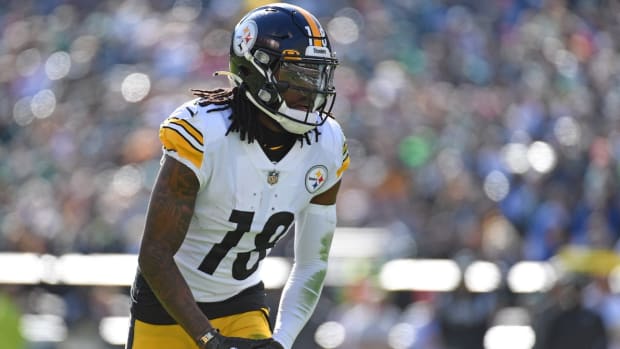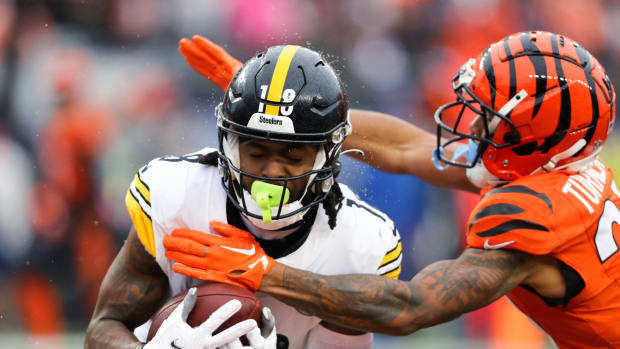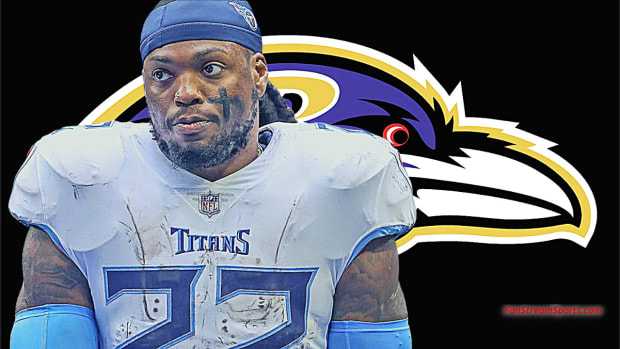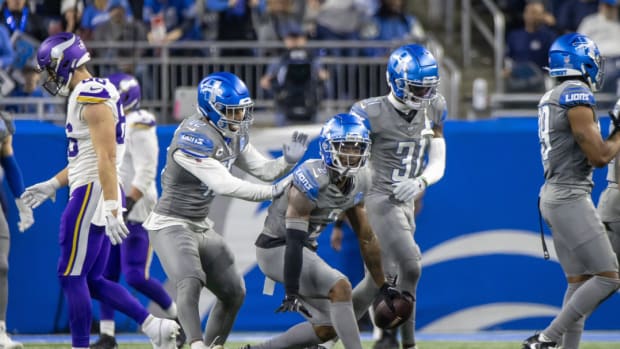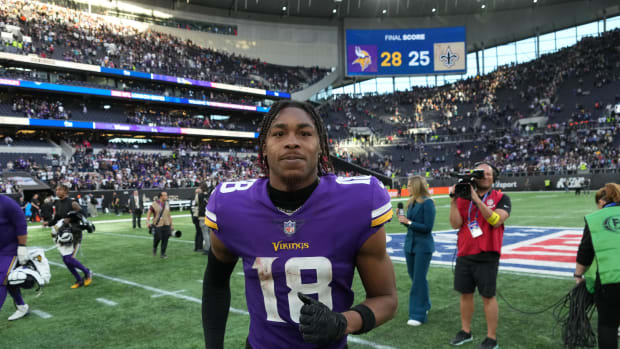How America Really Feels About the New England Patriots
I started with this supposition about the current Super Bowl champions: The residents of six states love the New England Patriots . . . and anyone from the other 44 hates them.
But as I traveled the country this summer, from training camp to training camp, that notion wasn't exactly borne out. “Envy” is the word used by former Bears receiver Tom Waddle, now a talk radio host in Chicago. John Canzano, an Oregonian columnist and radio host, describes cheering for the Patriots as “like rooting for U.S. Steel—they're not relatable to the average person.” But admiration was a prevailing feeling too. In mid-August, with a horde of 1,500-odd Patriots-apparel-clad fans lining the field during a practice against the Texans in West Virginia, Hall of Fame baseball manager Tony La Russa and former Indiana basketball coach Tom Crean stood with Bill Belichick in an end zone, mining the three-time NFL Coach of the Year for nuggets on sustained success.
And so I've come to believe that America's feelings about the Patriots have, in fact, evolved. Eight years ago—after three Super Bowl wins and one cheating scandal, Spygate, in 2007—Belichick & Co. seemed despised by a larger cross-section of fans than they are today. But the Pats have since been to four more Super Bowls and won two, each with incredibly poised play as the game hung in the balance. You can hate. You can be envious. You can be bored by the annual domination in one of the least competitive divisions in history. But, unless you feel the cheating scandals stain everything about their greatness, it's hard not to admire what they've done.
How to Beat the New England Patriots
As I started to explore these emotions, I proposed a question on Twitter: What best describes your feelings about the Patriots?
• Admiration
• Envy
• Hatred
• Boredom, bc they win 24/7
In half a day I was avalanched with more than 16,800 responses, and the results surprised me: 46% chose admiration, 27% hatred, 14% envy and 13% boredom. Less than three in 10 football followers hate the Pats, according to this very unscientific poll.
My conclusion? Americans might truly dislike the Patriots, in many ways. We may not trust that every one of their victories this century has been won fairly. But there appears to be a growing (if grudging) respect for a team that has stayed on top for 17 years in this sporting society that chips away at greatness every day.
Landry Locker, a producer for SportsRadio 610 in Houston, told me he changed his opinion on Tom Brady and his brethren after their Super Bowl LI comeback last February, and after listening to Brady speak about his devotion to football. “Brady talks about football the way other people talk about their loved ones,” Locker says. “How do you not respect a man who reveres the game the way he does?”
New England Patriots: 10 Things You Need to Know
Let's say you hated Belichick after the Spygate scandal. New England, seemingly on the same strategic playing field as the other 31 teams from 2007 onward, won nine division titles in the last 10 seasons and reached four Super Bowls, winning two. Or say you hated the pretty-boy QB with the supermodel wife, and that you were further conflicted by his four-game suspension in '16 for allegedly tampering with game balls. But then you saw him orchestrate the greatest comeback in NFL history, from down 28--3, to win Super Bowl LI. The Patriots, for a generation, have been metronomes of success. And many of those haters are turning into respecters.
A small but representative sampling of the diverse reactions to that Twitter poll:
“They are a misunderstood dynasty with a lot of haters,” says Doug McCready, of Grand Rapids. “Belichick is a genius and Tom is the GOAT. How can you not love them?”
Daniel Carlton, of Oakland: “There is no rule or trend they have not dissected.”
Ryan McCartney, of Pittsburgh: “I hate the Patriots. It's hard for me to admire what they have accomplished because of the controversy that has surrounded them. When the Patriots win, America loses.”
Harold Drumheller, of Evington, Va.: “Love or loathe them, the Patriots have developed a great organizational model. Their consistency in the salary cap era has been unparalleled, and they continue to retool their product.”
Bob Dahlstrom, of Willcox, Ariz.: “It irks me that an organization that has repeatedly been penalized by the commissioner keeps winning championships. It sends a worrisome message to the other 31 franchises.”
J.P. Isabelle—a New Englander—of Barre, Vt.: “They hate us because they ain't us.”
Greg Nallo, of Hudson, Ohio: “The thing that irks me most is they probably could have achieved all their success honestly, in which case I'd admire them. But they didn't.”
Finally I asked Julian Edelman, hero of Super Bowl LI, about how his team is received. “Consistent winning,” he says. “A lot of people don't like that.”
* * *
This is hardly new, the idea of hating or envying or being sick of a wildly successful NFL team. When I was in college, in the late '70s, the Cowboys were the team America was severely conflicted about. (Not too much has changed there.) I recently asked that team's architect, former vice president of scouting Gil Brandt, what percentage of people loved that old franchise and what percentage loathed it.
“I'd go around the country in those days, and I felt about 75% of the people loved us and 25% didn't like us,” Brandt says.
Brandt may be erring on the side of reverence, but it's an interesting notion: 25% Cowboys hate, then, if he is correct; 27% Patriots hate now, if my Twitter poll is a remotely accurate measuring stick.
NFL Picks Week 1: Patriots vs. Chiefs on Thursday Night Football
Beginning in 1970 the Cowboys reached the Super Bowl five times in a decade. They won two of those. Two of their three losses were to the dominant team of the decade, the Steelers, who had a quiet coach, Chuck Noll, under traditional and respectful owners, the Rooney family.
Dallas had an all-American coach, Tom Landry, and an all-American quarterback, Roger Staubach, who served four years in the Navy before embarking on a Hall of Fame career with the Cowboys—nobody could hate that gentlemanly duo. But they could hate Dallas's collective embracing of the “America's Team” nickname, especially when the Cowboys weren't the best team of their day. They could hate the oilman owner, Clint Murchison, who didn't care in the pre-salary-cap NFL how much money he threw at his franchise. (“[Tex Schramm] didn't have a budget for the team,” says Brandt. “He had a forecast.”) And they could hate the brash club president and showman, Schramm, for his braggadocio and his attempts to influence league policy through his tight relationship with commissioner Pete Rozelle. When I married a Pittsburgh gal in 1980, it meant marrying into a pro-Steeler, anti-Cowboy family. “Rozelle always favors the Cryboys!” my father-in-law would say. He loved calling them the Cryboys, believing as he did that Schramm would go bawling to Rozelle when his team didn't get its way on some league ruling.
NFL Preview: Team-by-Team Scouting Reports
Says Brandt, “It was actually just the opposite: Pete bent over backwards to make sure no one could ever say [he favored us]. We had a terrible schedule at times—three in a row on the road, things like that. The bigger issue was that we had a pretty wealthy owner. We started pro days, for example. We would go to Ohio State in March and time their entire team [in the 40-yard dash]. Then we'd spend $600 of Clint's money on a big dinner to thank the coaches and their spouses. Clint didn't care, as long as it was helping us find players. But the rest of the league—and lots of fans—thought, Those goddam Cowboys, out there spending money like that. It's not fair.”
Where the envy and enmity inside the league reached a peak was in the Cowboys' pursuit of those college players around draft time. Brandt employed Murchison's money to maintain a crew of lawyers, car dealers, entrepreneurs and bankers who on draft day would fan out across the country, positioning themselves to sign unpicked players as free agents. “We'd have 55 or 60 guys signed before other teams really got started,” says Brandt. “People inside the league didn't like us. It was envy, jealousy. We had what they didn't.”
The Patriots, too, use their advantages to the max. They don't have Murchison's deep pockets, but they can use their standing as a constant Super Bowl contender to nab short-term free agents (Chris Long, Darrelle Revis) at team-friendly prices. They test the edges of the rulebook (like the oddball formations that angered the Ravens in the 2014 playoffs), and it ticks off the rest of the league.
* * *
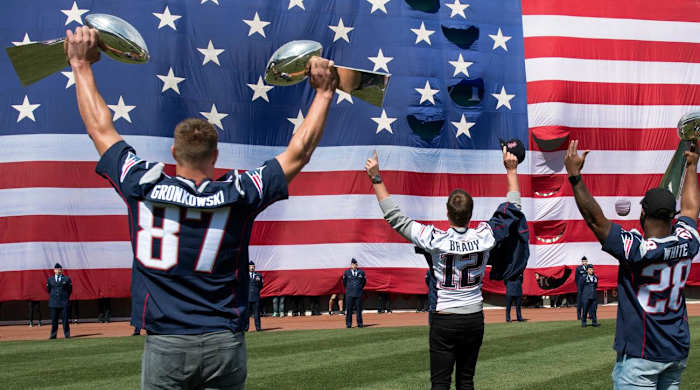
How does America really feel about Tom Brady, Rob Gronkowski and the New England Patriots?
Michael Ivins/Getty Images
“We will miss this era when it's over,” says one of the responders to the Twitter poll, Alex Armstrong, of Washington, D.C. Seventeen years and running, no sign of 7-9. It's going to get interesting when Belichick ultimately decides that Brady, now 40, is declining. Will he jettison his starter for Jimmy Garoppolo, whom he loves and whom he kept this off-season instead of trading him away? Brady knows he's around only as long as he's at the top of his game. “I don't ever want to play for another coach, another owner,” he told me earlier this year.
But what do we know? Belichick's probably going to find a way to keep this train moving. And that, at the very least, will keep us talking.
Question? Comment? Story idea? Let us know at talkback@themmqb.com
































